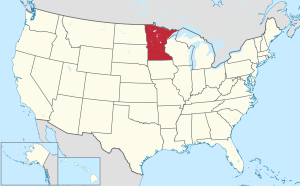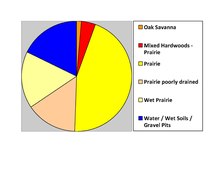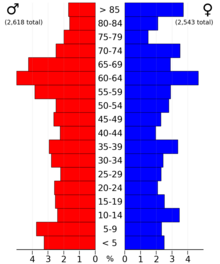Big Stone County, Minnesota
Big Stone County | |
|---|---|
 Big Stone County Courthouse in Ortonville, Minnesota. | |
 Location within the U.S. state of Minnesota | |
 Minnesota's location within the U.S. | |
| Coordinates: 45°26′N 96°25′W / 45.43°N 96.41°W | |
| Country | |
| State | |
| Founded | February 20, 1862 (created) 1874 (organized)[1] |
| Named for | Big Stone Lake |
| Seat | Ortonville |
| Largest city | Ortonville |
| Area | |
• Total | 528 sq mi (1,370 km2) |
| • Land | 499 sq mi (1,290 km2) |
| • Water | 29 sq mi (80 km2) 5.5% |
| Population (2020) | |
• Total | 5,166 |
• Estimate (2023) | 5,105 |
| • Density | 10.1/sq mi (3.9/km2) |
| Time zone | UTC−6 (Central) |
| • Summer (DST) | UTC−5 (CDT) |
| Congressional district | 7th |
| Website | bigstonecounty |
Big Stone County is a county in the U.S. state of Minnesota. As of the 2020 census, the population was 5,166.[2] Its county seat is Ortonville.[3]
History
The county was formed in 1862, and was organized in 1874. It is named for Big Stone Lake.[4][5]
Geography
Big Stone County lies on the western side of Minnesota. Its southwest boundary line abuts the east boundary line of the state of South Dakota. The Little Minnesota River flows along the county's southwestern boundary. Since 1937, a dam (Big Stone Lake Dam) has impounded the river's waters, creating Big Stone Lake. Water flowing out from this lake flows along the south boundary line of the county, and is known as the Minnesota River from that point. Fish Creek flows southwesterly through the northwestern part of the county, discharging into Big Stone Lake at the county's southwestern boundary.
The terrain of Big Stone County is low rolling hills, wooded or devoted to agriculture.[6] The terrain generally slopes to the south and east, although its southwestern portion slopes to the river valley. Its highest point is on its north line near the northwestern corner, 2.9 miles (4.7 km) east of Lagoona Beach, at 1,201 ft (366 m) ASL.[7][8] The county has a total area of 528 square miles (1,370 km2), of which 499 square miles (1,290 km2) is land and 29 square miles (75 km2) (5.5%) is water.[9]

Lakes
- Artichoke Lake - south edge in Akron Township, vast majority in Artichoke Township
- Barry Lake - Toqua Township
- Bentsen Lake - east half in Otrey Township, west half in Big Stone Township
- Big Stone Lake - Ortonville Township, Browns Valley Township, Foster Township, Prior Township, Big Stone Township
- Clear Lake - Toqua Township
- Cup Lake - Almond Township
- Deep Lake - Big Stone Township
- East Toqua Lake - Graceville Township
- Eli Lake - south three-quarters in Almond Township, west quarter in Clinton
- Fogarty Lake - Toqua Township
- Horseshoe Lake - Odessa Township
- Lannon Lake - Graceville Township
- Lindgren Lake - Ortonville Township
- Lake Leo - Graceville Township
- Lone Tree Lake - east three-quarters in Malta Township, west quarter in Almond Township
- Long Lake - Artichoke Township
- Long Tom Lake - northeast edge in Otrey Township, vast majority in Odessa Township
- Lysing Lake - vast majority in Almond Township, south edge in Big Stone Township
- Marsh Lake - Akron Township
- Moonshine Lake - Moonshine Township
- Moulton Lake - Big Stone Township
- Mundweiler Lake - Big Stone Township
- Munnwyler Lake - Ortonville Township
- Olson Lake - Big Stone Township
- Olson Lake - Otrey Township
- Otrey Lake - Otrey Township
- Peterson Lake - Odessa Township
- South Rothwell Lake - north edge in Graceville Township, vast majority in Almond Township
- Smithwicks Lake - Graceville Township
- Swenson Lake - Big Stone Township
- Twin Lakes - Big Stone Township
- West Toqua Lake - Graceville Township
- Walter Lake - Ortonville Township
Source: United States Census Bureau 2007 TIGER/Line Shapefiles[11]
Major highways
Adjacent counties
- Traverse County - north
- Stevens County - northeast
- Swift County - southeast
- Lac qui Parle County - south
- Grant County, South Dakota - southwest
- Roberts County, South Dakota - northwest
Protected areas
- Big Stone Lake State Park
- Big Stone National Wildlife Refuge (part)
- Big Stone Wildlife Management Preserve (part)
- Bonanza Prairie Scientific and Natural Area
- Clinton Prairie Scientific and Natural Area
- Dismal Swamp State Wildlife Management Area
- Freed State Wildlife Management Area
- Lac qui Parle State Wildlife Management Area
- Otrey State Wildlife Management Area
- Reisdorph State Wildlife Management Area
- Victor State Wildlife Management Area
Climate and weather
| Ortonville, Minnesota | ||||||||||||||||||||||||||||||||||||||||||||||||||||||||||||
|---|---|---|---|---|---|---|---|---|---|---|---|---|---|---|---|---|---|---|---|---|---|---|---|---|---|---|---|---|---|---|---|---|---|---|---|---|---|---|---|---|---|---|---|---|---|---|---|---|---|---|---|---|---|---|---|---|---|---|---|---|
| Climate chart (explanation) | ||||||||||||||||||||||||||||||||||||||||||||||||||||||||||||
| ||||||||||||||||||||||||||||||||||||||||||||||||||||||||||||
| ||||||||||||||||||||||||||||||||||||||||||||||||||||||||||||
In recent years, average temperatures in the county seat of Ortonville have ranged from a low of 1 °F (−17 °C) in January to a high of 84 °F (29 °C) in July, although a record low of −44 °F (−42 °C) was recorded in February 1994 and a record high of 108 °F (42 °C) was recorded in July 1966. Average monthly precipitation ranged from 0.43 inches (11 mm) in December to 3.85 inches (98 mm) in July.[12]
Demographics
| Census | Pop. | Note | %± |
|---|---|---|---|
| 1870 | 24 | — | |
| 1880 | 3,688 | 15,266.7% | |
| 1890 | 5,722 | 55.2% | |
| 1900 | 8,731 | 52.6% | |
| 1910 | 9,367 | 7.3% | |
| 1920 | 9,766 | 4.3% | |
| 1930 | 9,838 | 0.7% | |
| 1940 | 10,447 | 6.2% | |
| 1950 | 9,607 | −8.0% | |
| 1960 | 8,954 | −6.8% | |
| 1970 | 7,941 | −11.3% | |
| 1980 | 7,716 | −2.8% | |
| 1990 | 6,285 | −18.5% | |
| 2000 | 5,820 | −7.4% | |
| 2010 | 5,269 | −9.5% | |
| 2020 | 5,166 | −2.0% | |
| 2023 (est.) | 5,105 | [13] | −1.2% |
| U.S. Decennial Census[14] 1790-1960[15] 1900-1990[16] 1990-2000[17] 2010-2020[2] | |||
2020 census
| Race | Num. | Perc. |
|---|---|---|
| White (NH) | 4,809 | 93.1% |
| Black or African American (NH) | 19 | 0.37% |
| Native American (NH) | 34 | 0.66% |
| Asian (NH) | 12 | 0.23% |
| Pacific Islander (NH) | 4 | 0.07% |
| Other/Mixed (NH) | 148 | 2.7% |
| Hispanic or Latino | 140 | 2.7% |
2000 census

As of the census of 2000, there were 5,820 people, 2,377 households, and 1,611 families in the county. The population density was 11.7 per square mile (4.5/km2). There were 3,171 housing units at an average density of 6.35 per square mile (2.45/km2). The racial makeup of the county was 98.44% White, 0.17% Black or African American, 0.52% Native American, 0.41% Asian, 0.12% from other races, and 0.34% from two or more races. 0.34% of the population were Hispanic or Latino of any race. 45.7% were of German, 21.0% Norwegian, 8.0% Swedish and 6.3% Irish ancestry.
There were 2,377 households, out of which 29.00% had children under the age of 18 living with them, 59.60% were married couples living together, 5.30% had a female householder with no husband present, and 32.20% were non-families. 30.20% of all households were made up of individuals, and 16.90% had someone living alone who was 65 years of age or older. The average household size was 2.38 and the average family size was 2.97.
The county population contained 24.80% under the age of 18, 5.30% from 18 to 24, 21.90% from 25 to 44, 24.00% from 45 to 64, and 24.00% who were 65 years of age or older. The median age was 44 years. For every 100 females there were 94.30 males. For every 100 females age 18 and over, there were 91.10 males.
The median income for a household in the county was $30,721, and the median income for a family was $37,354. Males had a median income of $27,857 versus $20,123 for females. The per capita income for the county was $15,708. About 7.80% of families and 12.00% of the population were below the poverty line, including 14.50% of those under age 18 and 8.80% of those age 65 or over.
Communities
Cities
Unincorporated communities
Townships
Government and politics
Between 1928 and 2008, Big Stone County voted Democratic in every election except for two nationwide Republican landslides in 1952 and 1980. The only other time between 1928 and 2000 that the Republican candidate lost by less than 10% was Ronald Reagan during his 1984 landslide reelection. Beginning in 2000, the Democratic margins began to shrink, with George W. Bush losing by about 2% in both 2000 and 2004, and by a margin of no more than 60 votes. Despite favoring Barack Obama by over 6% in 2008, this would prove to be the most recent time Big Stone County would vote Democratic. Mitt Romney narrowly carried the county by 40 votes and less than 1.5% in 2012. But in 2016, Donald Trump greatly expanded the thin margin Romney won the county by as Democratic candidate Hillary Clinton lost by nearly 25%, the first time a Republican won by more than 5% in the county since 1924. Trump further increased his margin of victory in 2020 to over 27%, and improved even more in 2024 to nearly a 30% margin of victory.
| Year | Republican | Democratic | Third party(ies) | |||
|---|---|---|---|---|---|---|
| No. | % | No. | % | No. | % | |
| 2024 | 1,796 | 63.60% | 964 | 34.14% | 64 | 2.27% |
| 2020 | 1,863 | 62.64% | 1,053 | 35.41% | 58 | 1.95% |
| 2016 | 1,608 | 58.37% | 921 | 33.43% | 226 | 8.20% |
| 2012 | 1,385 | 49.66% | 1,345 | 48.23% | 59 | 2.12% |
| 2008 | 1,362 | 45.55% | 1,552 | 51.91% | 76 | 2.54% |
| 2004 | 1,483 | 48.35% | 1,536 | 50.08% | 48 | 1.57% |
| 2000 | 1,370 | 45.97% | 1,430 | 47.99% | 180 | 6.04% |
| 1996 | 990 | 32.99% | 1,619 | 53.95% | 392 | 13.06% |
| 1992 | 1,052 | 30.76% | 1,610 | 47.08% | 758 | 22.16% |
| 1988 | 1,469 | 41.66% | 2,026 | 57.46% | 31 | 0.88% |
| 1984 | 1,821 | 47.34% | 1,994 | 51.83% | 32 | 0.83% |
| 1980 | 1,950 | 47.67% | 1,814 | 44.34% | 327 | 7.99% |
| 1976 | 1,332 | 33.24% | 2,581 | 64.41% | 94 | 2.35% |
| 1972 | 1,748 | 43.52% | 2,185 | 54.39% | 84 | 2.09% |
| 1968 | 1,645 | 41.69% | 2,119 | 53.70% | 182 | 4.61% |
| 1964 | 1,331 | 31.90% | 2,831 | 67.86% | 10 | 0.24% |
| 1960 | 1,834 | 42.83% | 2,437 | 56.91% | 11 | 0.26% |
| 1956 | 1,737 | 44.25% | 2,180 | 55.54% | 8 | 0.20% |
| 1952 | 2,260 | 51.46% | 2,107 | 47.97% | 25 | 0.57% |
| 1948 | 1,321 | 33.99% | 2,466 | 63.46% | 99 | 2.55% |
| 1944 | 1,608 | 42.86% | 2,120 | 56.50% | 24 | 0.64% |
| 1940 | 1,925 | 42.95% | 2,517 | 56.16% | 40 | 0.89% |
| 1936 | 1,116 | 27.91% | 2,648 | 66.22% | 235 | 5.88% |
| 1932 | 868 | 20.99% | 3,200 | 77.37% | 68 | 1.64% |
| 1928 | 1,641 | 43.20% | 2,133 | 56.15% | 25 | 0.66% |
| 1924 | 1,524 | 46.14% | 260 | 7.87% | 1,519 | 45.99% |
| 1920 | 2,415 | 78.16% | 451 | 14.60% | 224 | 7.25% |
| 1916 | 810 | 44.88% | 869 | 48.14% | 126 | 6.98% |
| 1912 | 244 | 14.56% | 677 | 40.39% | 755 | 45.05% |
| 1908 | 965 | 57.78% | 565 | 33.83% | 140 | 8.38% |
| 1904 | 1,234 | 73.10% | 318 | 18.84% | 136 | 8.06% |
| 1900 | 1,081 | 59.27% | 644 | 35.31% | 99 | 5.43% |
| 1896 | 1,048 | 55.72% | 742 | 39.45% | 91 | 4.84% |
| 1892 | 576 | 41.68% | 498 | 36.03% | 308 | 22.29% |
| Position | Name | District | |
|---|---|---|---|
| Commissioner | Chad Zimmel | District 1 | |
| Commissioner | Wade Athey | District 2 | |
| Commissioner and Chairperson | Brent Olson | District 3 | |
| Commissioner | Roger Sandberg | District 4 | |
| Commissioner | Jeff Klages | District 5 | |
| Position | Name | Affiliation | District | |
|---|---|---|---|---|
| Senate | Torrey Westrom[22] | Republican | District 12 | |
| House of Representatives | Jeff Backer[23] | Republican | District 12A | |
| Position | Name | Affiliation | District | |
|---|---|---|---|---|
| House of Representatives | Michelle Fischbach | Republican | 7th | |
| Senate | Amy Klobuchar[24] | Democrat | N/A | |
| Senate | Tina Smith[25] | Democrat | N/A | |
Education
School districts include:[26]
- Chokio-Alberta Public School District
- Clinton-Graceville-Beardsley School District
- Lac Qui Parle Valley School District
- Ortonville Public Schools
See also
- National Register of Historic Places listings in Big Stone County, Minnesota
- List of Minnesota placenames of Native American origin
References
- ^ "Minnesota Place Names". Minnesota Historical Society. Archived from the original on October 25, 2014. Retrieved March 17, 2014.
- ^ a b "State & County QuickFacts". United States Census Bureau. Retrieved April 19, 2023.
- ^ "Find a County". National Association of Counties. Archived from the original on May 31, 2011. Retrieved June 7, 2011.
- ^ Upham, Warren (2001). Minnesota Place Names: A Geographical Encyclopedia (3rd ed.). Minnesota Historical Society. p. 55. ISBN 0-87351-396-7.
- ^ "County History". Welcome to Big Stone County. Retrieved March 10, 2024.
- ^ a b Big Stone County MN Google Maps (accessed March 5, 2019)
- ^ ""Find an Altitude/Big Stone County MN" Google Maps (accessed March 5, 2019)". Archived from the original on May 21, 2019. Retrieved March 5, 2019.
- ^ Big Stone County High Point, Minnesota. PeakBagger.com (accessed May 5, 2019)
- ^ "2010 Census Gazetteer Files". United States Census Bureau. August 22, 2012. Archived from the original on October 6, 2014. Retrieved October 5, 2014.
- ^ Nelson, Steven (2011). Savanna Soils of Minnesota. Minnesota: Self. pp. 65-67. ISBN 978-0-615-50320-2.[self-published source]
- ^ "United States Census Bureau 2007 TIGER/Line Shapefiles". Archived from the original on March 10, 2007.
- ^ a b "Monthly Averages for Ortonville MN". The Weather Channel. Retrieved November 6, 2011.
- ^ "Annual Estimates of the Resident Population for Counties: April 1, 2020 to July 1, 2023". Retrieved March 18, 2024.
- ^ "U.S. Decennial Census". United States Census Bureau. Retrieved October 5, 2014.
- ^ "Historical Census Browser". University of Virginia Library. Retrieved October 5, 2014.
- ^ "Population of Counties by Decennial Census: 1900 to 1990". United States Census Bureau. Retrieved October 5, 2014.
- ^ "Census 2000 PHC-T-4. Ranking Tables for Counties: 1990 and 2000" (PDF). United States Census Bureau. Archived (PDF) from the original on March 27, 2010. Retrieved October 5, 2014.
- ^ "P2 HISPANIC OR LATINO, AND NOT HISPANIC OR LATINO BY RACE – 2020: DEC Redistricting Data (PL 94-171) – Big Stone County, Minnesota".
- ^ Leip, David. "Atlas of US Presidential Elections". uselectionatlas.org. Retrieved April 11, 2018.
- ^ The leading "other" candidate, Progressive Theodore Roosevelt, received 591 votes, while Socialist candidate Eugene Debs received 98 votes, Prohibition candidate Eugene Chafin received 62 votes, and Socialist Labor candidate Arthur Reimer received 4 votes.
- ^ "Welcome to Big Stone County Minnesota". www.bigstonecounty.gov. Retrieved January 23, 2023.
- ^ "MN State Senate". www.senate.mn. Retrieved June 24, 2020.
- ^ "Rep. Jeff Backer (12A) - Minnesota House of Representatives". www.house.leg.state.mn.us. Retrieved June 24, 2020.
- ^ "U.S. Senator Amy Klobuchar". www.klobuchar.senate.gov. Retrieved June 24, 2020.
- ^ "Home". Senator Tina Smith. Retrieved June 24, 2020.
- ^ "2020 CENSUS - SCHOOL DISTRICT REFERENCE MAP: Big Stone County, MN" (PDF). U.S. Census Bureau. Retrieved April 10, 2024. - Text list

